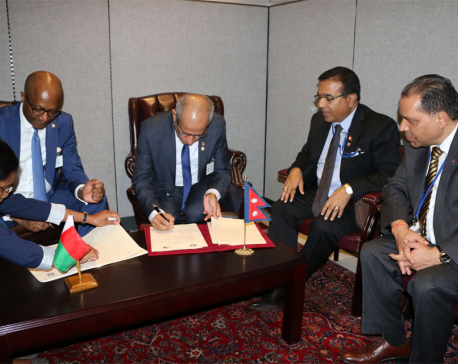
OR
More from Author
One simple and cost-effective way to promote our soft power is to establish a competitive Nepal Scholarship Fund under the joint jurisdiction of our foreign and education ministries.
Nepal is poor, and hence it makes no sense to talk about promoting our soft power abroad, so goes our thinking. We tend to equate soft power mostly with development aid, political system, economy and overall “attractiveness” in the eyes of foreigners. And we know we are lacking in all these. We receive development aid, our political system is not something that others seem keen to emulate and while foreigners admire the natural beauty of Nepal, not many are interested to come here to live, work and study.
But this shouldn’t stop us from promoting our soft power abroad. All that is needed is determination and some money.
One simple and cost-effective way to promote our soft power abroad is to establish a competitive Nepal Scholarship Fund under the joint jurisdiction of Ministry of Foreign Affairs and the Ministry of Education, or as an autonomous body that provides deserving foreign scholars and graduate students grants to conduct research of their interest in Nepal, whether independently or through institutional affiliations.
We can start with SAARC member states—minus Nepal—and China. If we get two professors and two graduate students from each country, then that’s 32 foreigners a year. And if we provide the professors with US $25,000 and grad students with $15,000 for one academic year, that comes to $640,000 a year. Add another $50,000 a year will be spent on administrative expenses in Nepal and to pay to selection committee members in each country. That comes to around Rs 75 million a year. If you think it is a lot for a country like Nepal, then just read the news.
Big bangs for bucks
We lose billions a year in embezzlement. Almost 18 times the amount I have proposed is spent on paying the “extra” ministers in the present cabinet. We also spend millions each year to provide security to leaders who do not need that level of security at all. To be honest, Rs 75 million is probably lost in corruption in a day in our customs and tax revenue offices.
Therefore, this in no way would drain government coffers. But if it is reluctant to spend the money on something that will enhance Nepal’s image abroad—something we cannot rule out—then it can seek help from private businesses and wealthy individuals through something akin to charitable contribution deduction in the US. We can have a provision that allows private businesses and individuals to donate up to three percent of their annual income to the fund, and the government will deduct this amount from their total taxable income. If the three percent exceeds Rs 10 million, then they should be allowed to name the scholarship after their company or whoever they wish it named after. Just imagine the money the fund will have in a year!
Once the ball gets rolling, the fund can create its own university with distinguished faculty from Nepal and abroad, and with world class research centers. It will enroll scholarship recipients along with the best and brightest Nepali students in structured programs that lead to academic degrees. As things now stand, our universities are no magnets for the best students from abroad, and the fund can work at changing this.
When the “free of political influence and interference” research centers are in place, we can then expand the scholarship to Southeast Asian countries, along with Japan and Korea, and in a phase-wise manner, to other countries in Asia.
As I have written elsewhere, the fund can do a lot of other things as well such as gifting statues of Hindu and Buddhist gods to be placed prominently in college campuses of countries where the scholarship is not yet available so that students know where Nepal is and Google a few things about us. Now that is already better than they knowing absolutely nothing about us. They will easily associate the images they see in their college premises to Nepal. And I can vouch for this from my personal experience.
Cervantes the diplomat
There is a statue of Miguel de Cervantes in the premises of Peking University that was gifted to it by the city of Madrid. Until I saw the statue I knew nothing about the writer or even about Spain besides its football teams. But seeing him every day got me curious and made me Google him and to learn a few things about him. Although I am yet to read his famous work, Don Quixote, every time I hear of Spain, I associate it with Cervantes. Now that’s a win-win for the city of Madrid that gifted the statue and yours truly.
Because of that statue I got to know that Spain wasn’t lagging behind other European countries in producing great works in literature and it is much more than football teams and matadors. And the city of Madrid got me to know more about Spain.
Similarly, the fund can also gift books on Nepal, as well as digital facsimiles of ancient manuscripts and Nepali paintings, to university libraries abroad. With time, we can expand the scholarship to many, if not all, countries of the world and even fund graduate students focusing on Nepal in universities abroad.
You may very well ask, okay, but how does it benefit us? It will benefit us in many ways. It will rekindle the academics interest on Nepal abroad, and we too will greatly benefit from researches by both experts and young students on various aspects of our society.
Let’s admit it, we have been relying on outdated works by foreigners on Nepal. So this will help us see ourselves in a new light, and also bring to our attention things that we consciously or unconsciously leave out when studying various aspects of our own society.
Just to make sure that the work of scholarship is accessible to all, unlike the works of the past laden with academic jargons and only meant for scholars, the fund’s recipients should be asked to submit their findings/papers in plain and simple English. These will be published it in both English and Nepali and also be made available online.
Moreover, the scholarships will be our way of showing appreciation for the international community’s generosity. Most importantly, one day the graduate students who benefit from the scholarship can very well be in the position of importance in her country and will thus know how to deal with us and be more sympathetic to our needs, desires and positions on various issues—the real reason behind almost all scholarships provided by governments to foreign students.
To conclude, it’s us, our lack of vision, and our defeatist mindset that’s stopping us from enhancing our image abroad, nothing and no one else.
trailokyaa@yahoo.com
You May Like This

How do we measure knowledge?
“If you only need good grades and not the learning,” I tell my students, joking, “don’t bother using the library,... Read More...

Nepal, Madagascar establish diplomatic relations
NEW YORK, Sept 27: Nepal and the Republic of Madagascar have established diplomatic relations today. ... Read More...

Scholarship of Rs 500,000 to students in remote area
SALYAN, Dec 10: Some 120 students pursuing their school education in the remote parts of Salyan district have received scholarship. Read More...





Just In
- MoHP cautions docs working in govt hospitals not to work in private ones
- Over 400,000 tourists visited Mustang by road last year
- 19 hydropower projects to be showcased at investment summit
- Global oil and gold prices surge as Israel retaliates against Iran
- Sajha Yatayat cancels CEO appointment process for lack of candidates
- Govt padlocks Nepal Scouts’ property illegally occupied by NC lawmaker Deepak Khadka
- FWEAN meets with President Paudel to solicit support for women entrepreneurship
- Koshi provincial assembly passes resolution motion calling for special session by majority votes







_20220508065243.jpg)






Leave A Comment